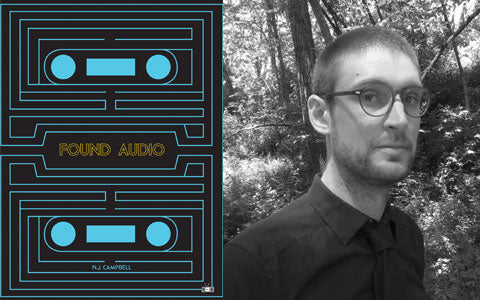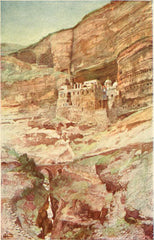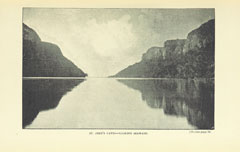N.J. Campbell discusses Found Audio

It sounds like a long way off now, but next July 2017 we will publish one of the more unsettling manuscripts to come across my desk. For the first time ever, Found Audio presents a complete transcription of the audio recordings of an unnamed adventure journalist and his decades-long pursuit of the Borgesian "City of Dreams," alongside analysis from audio expert Amrapali Anna Singh.
An expert in her field, Singh is capable of discerning the minutiae from audio footage. For instance, whether the room where the recording is taking place is humid, or whether there are other people in the room that aren't speaking. One day, a mysterious man appears at her office in Dutch Harbor, Alaska, having traveled a great distance to bring her three Type IV audio cassettes that bear the stamp of a library in Buenos Aires that may or may not exist.
 On the cassettes is the deposition of an adventure journalist and his obsessive pursuit of an amorphous, legendary, and puzzling "City of Dreams." Spanning decades, his quest leads him from a snake-hunter in the Louisiana bayou to the walled city of Kowloon on the eve of its destruction, from the Singing Dunes of Mongolia to a chess tournament in Istanbul. The deposition also begs the question: Who is making the recording, and why?
On the cassettes is the deposition of an adventure journalist and his obsessive pursuit of an amorphous, legendary, and puzzling "City of Dreams." Spanning decades, his quest leads him from a snake-hunter in the Louisiana bayou to the walled city of Kowloon on the eve of its destruction, from the Singing Dunes of Mongolia to a chess tournament in Istanbul. The deposition also begs the question: Who is making the recording, and why?
Despite being explicitly instructed not to, curiosity gets the better of Singh and she mails a transcription of the cassettes with her analysis to an acquaintance before vanishing. The man who bore the cassettes, too, has disappeared. The journalist was unnamed.
Steve Erickson says that, "Amid the static of contemporary literature can be heard blips of fiction-future in N.J. Campbell’s defiantly bold Found Audio."
Following is an interview with N.J. Campbell about the project.
Q: How did you first come into contact with what we’re publishing as Found Audio?
N.J.: In 2006, I was still in college and working for a fairly well-respected freelance editor while on summer break, an editor whose name I’m not comfortable mentioning. She was mostly kind and very good at her job, but as I’m not able to explain the situation in a short interview as to why I’m not comfortable mentioning her name, I’d rather just avoid details on this one. The important thing is that while I was working for her, I ended up reading the manuscript transcribed and annotated by Ms. Singh that became the basis for Found Audio. That’s how I first came in contact with the material in the book.
Q: What was the rationale in terms of labeling Found Audio a novel?
N.J: That was a difficult choice. As non-fiction, I could not get a publisher to publish the manuscript. No matter how much research I’ve done, I’ve only been able to produce anecdotal evidence as to the origins of who might have been involved in its creation, and as that’s not very credible in the realm of fact-based journalism, no one has been willing to touch it. Now, as I have continued to research the manuscript and will continue to do so, it may be that I’ll find the evidence I need to form more conscientious conclusions about its origins and who was involved and in what way, though, as it stands, I’ve really only been interested in getting this manuscript to print, as others may be of some help in sorting out some of the details.
It’s ironic that, when I originally rejected this manuscript when I was working for the freelance editor I mentioned before, that her other reader thought this might be publishable as fiction. The fact that I now, gratefully, have been able to get the project o print under the illusion that it’s a ‘novel’ in no way escapes me, nor does the fact that I rejected it in the same way others did subsequently. I am certain this would not have been Amrapali’s wish, though as she’s not here to champion the work herself, this will have to do, at least for now. To be clear, though, I’m grateful that the manuscript is being published, and, as I know there are many legal reasons why it must be published under its current designation, I’m still not thrilled that the work isn’t getting the accreditation it deserves.
Q: Can you discuss how you attempted to contact some of the individuals mentioned in the transcript, as well as with Singh? What was that process like?
N.J.: I travelled to Alaska, Louisiana, Arizona, and South Africa and I considered travelling to France, Argentina, and China, though I decided against the last three locations for various reasons. I made hundreds of phone calls, spent thousands of hours searching the internet and attempted to track down public records in almost four countries. The process was, by turns, invigorating, exhausting and terrifying. I spent most of my research hours in different public libraries across the Mid-West and making phone calls from pay phones in numerous locations as well. I did this for several reasons, but as being discreet about my intentions with regard to the information I was after was the highest priority for me, I had no other choice. I realize this makes me sound a bit paranoid, but as the circumstances surrounding my investigations turned precarious, I did what I felt was best for getting the information I required. That’s been the price of getting the manuscript this far, and I’m mostly comfortable with the choices I’ve made surrounding what I’ve done to get here.
The process was, by turns, invigorating, exhausting and terrifying. I spent most of my research hours in different public libraries across the Mid-West and making phone calls from pay phones in numerous locations as well. I did this for several reasons, but as being discreet about my intentions with regard to the information I was after was the highest priority for me, I had no other choice. I realize this makes me sound a bit paranoid, but as the circumstances surrounding my investigations turned precarious, I did what I felt was best for getting the information I required. That’s been the price of getting the manuscript this far, and I’m mostly comfortable with the choices I’ve made surrounding what I’ve done to get here.
As for travelling, it was fairly uneventful, though at times a bit unnerving. In South Africa, I had a long trip and a good conversation, but nothing incredibly helpful. In the bayou, the case was mostly the same. As for Alaska, what was there for me was ambiguous. And in Arizona, I found the most helpful information by far, although I still only found traces of Ms. Singh’s presence.
That’s been the journey for the most part so far, dead ends that branch into maybes and possibilities that then leave unanswered questions and even more uncertainty. As it stands, I’ve located the whereabouts of individuals described in the manuscript maybe half a dozen times in almost twice as many years, and those instances were only where those people were at one point in time or another, never where the moment I was searching for them. But that’s the nature of the type of research I’ve been doing for this long. It’s difficult and mostly unrewarding in the sense of finding definite connections that lead to concrete answers. Though it’s definitely a labor of love, especially when you think about how you’re working against chance and, more likely than not, the Biblioteca Nacional de Investigacion de Buenos Aires.
Q: The unnamed journalist-narrator on the cassettes is first introduced to the “City of Dreams” by another journalist, who seems to present it as a myth, a journalist’s folktale, or as an expression to represent something which doesn’t exist. What has been your own experience in terms of researching the City of Dreams?
N.J.: Not unlike the journalist’s, though not entirely like his journey either. He was a professional and found quite a few connections, albeit mostly by chance, that led to much more concrete outcomes. I, on the other hand, have been pursuing this over roughly the same amount of time, though with one key difference. He, explicitly, wanted to find the “City of Dreams,” whereas I only want to confirm others have seen or heard of it. I’m not interested in getting closer to the “City,” not with everything I’ve experienced just trying to fact-check the place. At least, not without a better idea of what or who exactly I’m dealing with—either those involved with the “City” or those involved with finding it, though the two groups could be related to one another or possibly, though I personally doubt it, the same. Regardless of what their relationship is or might be, I’ve considered many such possibilities, and, again, I’m only really interested in confirming that others have seen it or know about it.

As for whether it’s a myth, for me, personally, it still is, though for the narrator, he possibly found what he was looking for. I’d like it to be otherwise for myself. I’d like to have something more than anecdotal evidence for its existence, but I don’t. And as this whole inquiry into the manuscript has been an inquiry into the truth, I have to be honest here. I owe it to anyone who might be as inspired by the events it contains as I have been.
Q: Do you ever imagine what might happen in the wake of publishing Found Audio? For instance, the Biblioteca Nacional de Investigacion de Buenos Aires finally responds to our request for comment, or Amrapali Anna Singh resurfaces.
N.J.: Imagine? That’s practically all I’ve thought about since you agreed to publish the manuscript. The scenarios are various and their outcomes equally so, but the general tenor of what might happen is mostly the same, though of two basically different reactions in two different categories.
If Biblioteca Nacional de Investigacion de Buenos Aires responds to your request, then maybe only a dozen people will ever see this interview or even read about the existence of this book, let alone the book itself. I’m sure they will attempt, if not certainly succeed, in censoring the publication of the book such that it is replaced with another book entirely—one of the same name but of none of the same content, or that your good and wonderful publishing house is entangled in some form of a scandal so heinous, be it bankruptcy, libel, or what have you, that you are forced to pull the book from your catalog.
If, on the other hand, Amrapali surfaces, then I believe I will most likely have answers to some of the questions I’ve been pondering for over a decade. If that were to happen, I would be happy, even grateful, to work though all the legal nightmares that would almost certainly ensure, if only to get to speak to her for a few minutes about her experiences. Such is the nature of my dedication to discovering the truth about this manuscript. I’m certain it sounds completely—absolutely—unreasonable by most standards, if not insane, but if anyone else had gone through what I have just to come this far, I’m sure they would feel the same.
Critics, booksellers, and librarians interested in receiving an advance reading copy of Found Audio may do so here.
To pre-order Found Audio, you may do so here.


Carol Carpenter - June 13, 2017
I read this amazing book. This interview is…committed.
Kammy Keyes - September 07, 2016
Can’t wait for this exciting new read! Pins and needles excited.